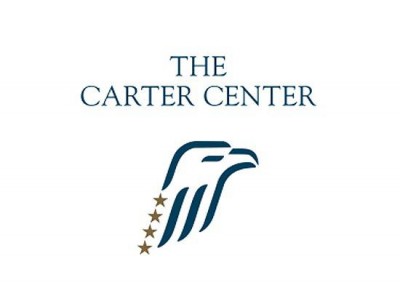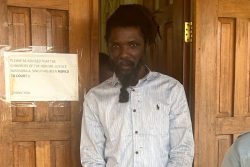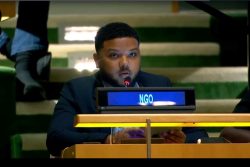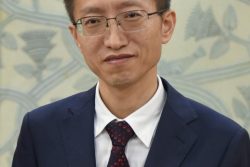Following its lauding of voting at the May 11th general elections, the Carter Center today issued a detailed preliminary statement calling for reform of the elections commission, campaign financing laws and urging the political parties here to reevaluate their structures as their leaders appear out of touch with Guyanese.
The statement issued by the Center follows:
GEORGETOWN, GUYANA — The Carter Center today released its final preliminary statement on Guyana’s May 11 general and regional elections.
 The Center’s key findings include:
The Center’s key findings include:
- There was a generally calm and peaceful atmosphere during election day, and Carter Center observers assessed procedures positively at all stations observed, with no major irregularities reported. Polling staff at stations observed were well-trained, and voting progressed with very few technical errors and in a manner that protected the integrity of the vote.
- Carter Center observers reported that ballot reconciliation and the completion of Statements of Polls (SoPs) generally adhered to procedures in polling stations visited, and party agents and citizen observers were invited to sign and receive copies of the results. However, the atmosphere during the counting period became anxious in some areas of the country, and several incidents were reported in Georgetown, where crowds gathered around polling stations, which contributed to a delay in the transfer of some electoral materials and processing of results. The Guyana Elections Commission and the police coordinated a response to facilitate the transfer of materials.
- Post-election Period. After May 11, Carter Center observers continued to observe the transmission and tabulation of results at all levels, including the central tabulation process in Georgetown, with observers providing a presence 24 hours a day. Carter Center observers were not limited in their access to the data-entry rooms of GECOM. The Center learned, and GECOM acknowledged, that some fraudulent Statements of Polls had been created and inserted into GECOM national tabulation. However, GECOM easily identified the forgeries and did not process them. Observers did not report any significant irregularities during the post-election tabulation and verification of results phases.
Carter Center staff and observers remain in Guyana and continue to consult with stakeholders and observe the post-election environment. The Center’s full statement, available here, provides a number of recommendations to improve future elections:
To the Guyana Elections Commission:
- Release polling-station level results data. The Carter Center urges GECOM to make complete data available as quickly as possible regarding results at the polling-station level. This is a recognized international best practice that can enhance public confidence in the process and its outcome.
- Build confidence in the voters’ list. GECOM, the registrar, and other departments of the government of Guyana should exchange accurate and complete information that will enable removal of the deceased from the voters’ list. In future elections, GECOM should take steps to allow an independent audit of the voters’ list.
- Improve the tabulation process. While the tabulation system in Guyana is thorough, the slow pace of the process creates a vacuum of information that fuels suspicion and mistrust. Guyana should consider a full review of tabulation procedures, possibly including steps such as a double-blind data-entry system to enhance accuracy and confidence. Improved tabulation procedures and timely dissemination of information will increase trust in the overall process.
- Improve accessibility for voters with disabilities. Many polling stations are difficult for voters with disabilities to access, requiring persons to navigate stairs, bridges, or narrow passageways. Although The Carter Center was informed that portable ramps would be provided to polling stations, observers did not see any. Tactile ballot guides are a great asset to elections in Guyana, and steps should be taken for future elections to ensure their full distribution, with voter education campaigns to inform voters of their use. Polling officials should also be trained on how the tactile ballot guide is to be used.
- Location of polling stations. Because of the lack of state establishments in some areas, 166 of Guyana’s 2,299 polling stations are located in private buildings and residences. While the establishment of polling stations on private property did not seem to negatively influence public confidence in the electoral process, GECOM should ensure that citizens can cast their ballot in a neutral environment.
- Communication and access to information.GECOM needs to review its policy on access to information and on the openness of GECOM commissioners’ meetings. Ideally these should be open to media and observers. In any case, agendas should be published well in advance and decisions should be made public.
To the government of Guyana:
- Election administration reform. Guyana should consider reforms that would reduce the politicized composition of GECOM and move toward an election management body with a structure, composition, and operations that are more consistent with international good practice and obligations, ensuring the independence and impartiality of the election management body.
- Consolidation of the electoral law. The consolidation of existing electoral law, which at present has to be established across a plethora of legal instruments, would enhance both the clarity and the certainty of the legal rules. In addition, the laws of Guyana, including those that pertain to elections, should be made more readily available and easily accessible to citizens.
- Fixed and zippered party lists. Consideration should be given to electoral reform efforts that would ensure candidate placement on party lists is fixed, increasing the links between citizens and elected officials and strengthening Guyana’s democratic foundations. Consideration should also be given to ensuring that party lists are “zippered” so that women and men are listed alternately on the list.
- Right to be a candidate and the freedom of association. Guyana should reconsider the barring of independent candidates from standing for office, as it undermines international commitments on the freedom of association and the right to stand for elections. Consideration should be given to amending Article 156 of the constitution that gives political parties the power to remove a member of the National Assembly if they no longer support the party, which limits the freedom of association.
- Allow voting for political party agents and domestic observers. Consideration should be given to ensuring that political party agents and domestic observers are able to play their critical roles in increasing the transparency of the electoral process without sacrificing their right to vote when they are stationed at polls where they are not on the voters’ list. To this end, reform should focus on allowing agents to vote in the polling stations where they are deployed.
- Campaign finance. Establish legislation to introduce greater transparency into the sources of funding of political parties through reforms such as requiring disclosure of sources, not just in the context of elections; establishing party finance regulations with clear, rigorous, and enforceable regulations for reporting; requiring electoral contestants to make reports on their campaign expenditures publicly available, with strong penalties for those who do not comply with regulations. In addition, Guyana should consider establishing and enforcing realistic limits on campaign expenditures to help promote equity and avoid inequalities in access to resources, which undermine the democratic process.
- Registration of political parties. The government should consider establishing a formal process for the registration and regulation of political parties to ensure greater transparency and integrity.
- Code of conduct for political parties. While a code of conduct for political parties exists, the timeframe for its execution does little to improve the overall campaign environment. Unfortunately, the code of conduct was not signed until less than two weeks before election day, and more than two weeks after nomination day, limiting its ability to play a role during the majority of the campaign period. In future elections, the Code of Conduct for Political Parties should be signed much earlier in the process, and it should include a clear and strong enforcement mechanism.
- Local government elections. Guyana has not held local government elections since 1994, and the repercussions for development and the ability of government to serve its people are visible at the local level throughout the coastal region. The government should recommit to holding local government elections utilizing the legislation that was approved in the last parliament as the foundation for a new consensus law.
- Boundary delimitation. The distribution of electors per regional seat in the general elections is unequal. All districts deviate from the average of person-per-seat by more than 15 percent, a maximum advised by international best practice. The Carter Center recommends that the parliament amend legislation to address inequalities in geographical constituencies to ensure greater respect for the obligation of equal suffrage. In any case, the apportionment of the seats to the regions should be based on the latest available population statistics.
To Political Parties:
- Guyana must move beyond divisive politics, and its parties must find a way to work together constructively for the good of the country. While the political system enables a vigilant and energetic opposition, there must be a level of strategic cooperation to ensure that the state can perform its basic functions and regular local government elections can be held. The institutions of the state should not be held hostage to continuing cycles of inter-party conflict.
- Political parties should reevaluate their structure to ensure that they are well positioned to play their role in representing their supporters in government. Political party leaders appear out of touch with many Guyanese, limiting the effectiveness of the political elite in representing Guyana’s citizenry. All parties should strengthen their internal democracy and make their operating procedures more transparent.








